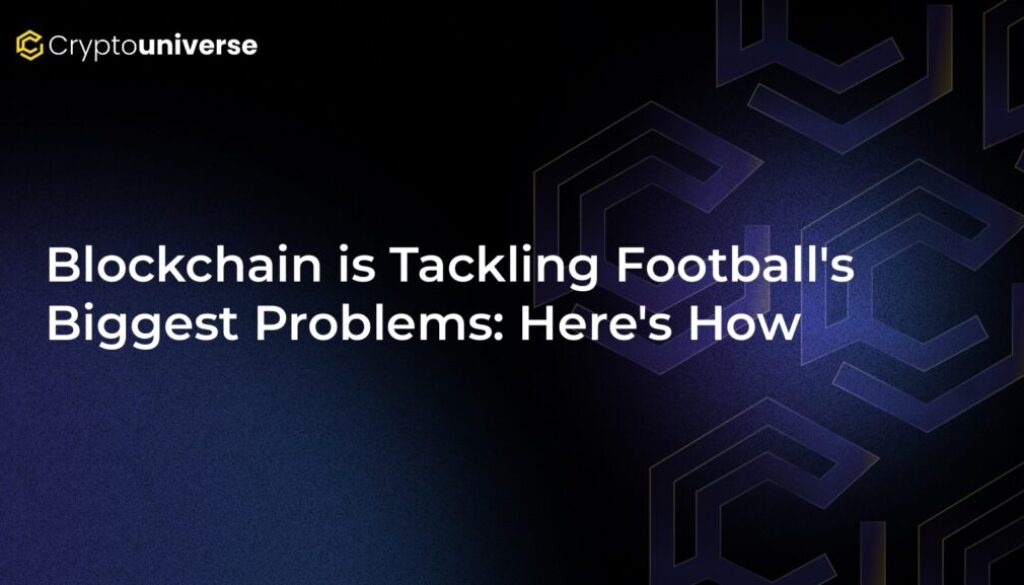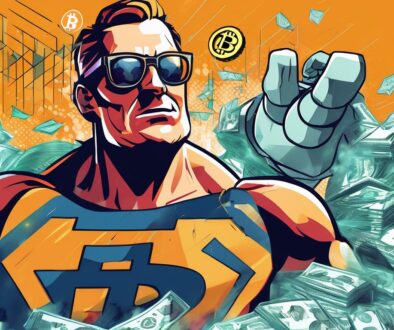Blockchain is Tackling Football’s Biggest Problems: Here’s How

Blockchain is Tackling Football’s Biggest Problems: Here’s How
With over 3.5 billion fans worldwide, football isn’t just a sport; it’s a global phenomenon, a cultural touchstone, and a multi-billion dollar industry. Yet, for all its modern glamour and high-stakes drama on the pitch, many of its background operations, particularly the player transfer system, remain surprisingly archaic. But a powerful new player is entering the field: blockchain technology.
The beautiful game is on the verge of a technological revolution. We are seeing blockchain emerging as an innovation in the football market, with the
The Red Card for Inefficiency: What’s Wrong with Football Transfers?
Anyone who follows the summer and winter transfer windows knows they are filled with suspense, rumors, and last-minute deals. Behind the scenes, however, the process is often a logistical nightmare. The current system is frequently bogged down by:
- Slow Settlements: International transfers can involve multiple banks, currencies, and regulatory bodies, leading to significant delays in payments.
- Lack of Transparency: With so many intermediaries—clubs, agents, lawyers, and banks—tracking the flow of money can be incredibly complex, creating opportunities for disputes and corruption.
- High Fees & Volatility: Cross-border transactions come with hefty fees and exposure to foreign exchange (FX) volatility, which can alter the value of a transfer deal by millions.
- Administrative Hurdles: The sheer volume of paperwork and manual verification required can slow down transactions, sometimes causing deals to collapse at the last minute.
This sluggish and opaque system particularly penalizes smaller clubs, which lack the resources to navigate its complexities, effectively creating barriers to a truly global marketplace.
Blockchain’s Playbook: Speed, Transparency, and Automation
Blockchain technology, combined with crypto rails, offers a direct and powerful solution to these long-standing problems. By creating a decentralized, transparent, and immutable ledger, it can overhaul the entire transfer process.
Smart Contracts: The Automated Transfer Deal
Imagine a transfer agreement where payment is automatically released to the selling club the moment a player passes their medical and signs the contract. This is the power of smart contracts—self-executing contracts with the terms of the agreement directly written into code. They can automate everything from transfer fee installments and agent commissions to performance-based bonuses, eliminating manual errors and ensuring instant, trustless settlement.
On-Chain Ledgers: A Single Source of Truth
By recording every part of a transaction on a blockchain, all involved parties have access to a single, unchangeable record. This radical transparency reduces the potential for fraud and disputes over payments, contract clauses, and solidarity payments to youth clubs. It’s like having a perfect, incorruptible digital paper trail for every deal.
The Giants Are On Board: FIFA Embraces Blockchain
Perhaps the most significant endorsement of this technology comes from the top. FIFA, the global governing body of football, is not just dipping its toes in the water; it’s diving in headfirst. Reports confirm that FIFA is launching its own L1 blockchain, utilizing Avalanche’s (AVAX) Subnet technology.
This move is monumental. By building its own dedicated blockchain, FIFA is creating a powerful infrastructure for a new generation of digital products, including:
- Digital Collectibles (NFTs)
- Blockchain-based Games
- Tokenized Fan Experiences
This signals a clear vision for a future where blockchain is integral to football’s digital ecosystem, offering better scalability, control, and a more seamless user experience for fans around the world.
Beyond Transfers: A New Era of Fan Engagement
While fixing the transfer market is a huge win, blockchain’s impact extends far beyond back-office operations. It’s creating entirely new ways for fans to connect with the clubs they love.
Web2 giants like OneFootball, with its 34 million users, are partnering with Web3 natives like Animoca Brands to build ecosystems powered by digital ownership. We’re also seeing historic deals, such as TokenFi’s partnership with Queens Park Rangers F.C., to introduce blockchain tokenization to professional football.
This movement is centered around a few key concepts:
- Fan Tokens: Digital assets that grant holders access to voting rights on club decisions (like jersey designs or goal celebration music), exclusive content, and unique rewards.
- Real-World Sports Assets (RWAs): The concept of turning a portion of a player’s future transfer rights, stadium revenue, or sponsorship deals into a tokenized, investable asset. This opens the door for fans to invest directly in the financial success of their clubs and players.
- Digital Ownership: True ownership of digital assets like collectibles and memorabilia, which can be bought, sold, and traded in a transparent market.
The Final Whistle
The integration of blockchain in football is not a distant dream; it’s happening right now. From streamlining the multi-billion dollar transfer market to creating a more engaged and empowered global fanbase, the technology is proving to be a true game-changer. By eliminating inefficiencies and building new, community-driven digital economies, blockchain is ensuring that the future of the beautiful game will be more transparent, efficient, and exciting than ever before.


